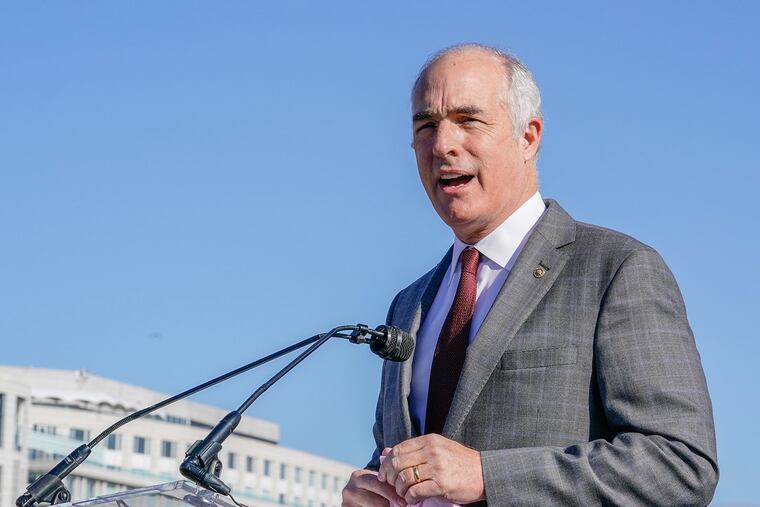Bob Casey joined the outrage as Democrats hammer Pat Toomey over a stalled bill to help veterans
Toomey's push to stall the PACT ACT, a veterans bill, over fiscal concerns has become a national controversy, drawing outrage from former service members and comedian Jon Stewart.

Sen. Bob Casey joined the firestorm of criticism Monday — much of it targeting his Pennsylvania colleague, Republican Sen. Pat Toomey — over GOP senators who have stalled a bill to deliver health care for veterans sick from burn pits or other toxic exposures.
Casey, who almost never directly criticizes Toomey, came close to doing so in a morning video call with reporters, blasting the 14 Republicans who have voted against the PACT Act since it first came up in June. That group included Toomey.
“These veterans have been waiting for years — waiting for years — for the federal government to do something. Why the hell should this be held up ... when someone is making the case, as some senators are, about appropriations down the road?” Casey said, nodding to Toomey without naming him.
“This bill is essential to meet our obligations, to fulfill our promises to them. These veterans already fulfilled their promises,” Casey said. “If we don’t do this, what kind of a country are we?”
Why Toomey voted against the veterans bill
The holdup of the bill has led to outrage from veterans and, prominently, comedian Jon Stewart, who has taken up the veterans’ cause. The bill aims to help veterans who say work around toxic burn pits has led to cancer and other ailments. While it passed the Senate in June with an 84-14 vote, the measure had to return to the chamber because of slight tweaks in the House.
This time, though, Republicans balked because of a funding mechanism in the bill. Toomey — who also voted against the measure the first time — has pushed for an amendment, saying the way it’s written now could open the door to $400 billion in unrelated spending.
“This is one of those games where you’ve got a bill that’s going to pass, so let’s sneak in this change in the budget rule so that it’ll be easy to spend money on other things in the future,” Toomey said in a Senate floor speech last week explaining his opposition.
Toomey says he and other Republicans aren’t against the underlying aim of the bill, and are trying to fix a potential spending end-around. There’s a “very easy path to a very big vote on this bill,” Toomey said, if the measure is altered.
Democrats and veterans say there’s no time to waste for people who are sick and awaiting help.
While Casey and Toomey differ sharply on policy, they rarely, if ever, openly criticize each other, and they work together on many issues. When asked specifically about Toomey on Monday, Casey said he hadn’t spoken to his Pennsylvania counterpart and pivoted toward Republicans more broadly.
What Toomey’s amendment would do
The fight hinges on the proposal to convert some “discretionary” veterans spending, which must be approved every year, to “mandatory,” which is essentially automatic. The change is aimed at ensuring that the veterans’ care covered by this bill isn’t hung up by annual budget fights. But Republicans say making some existing spending mandatory would leave behind a chunk of spending authority that could then could then be freed for other causes.
Toomey, a leading fiscal conservative who has the ear of many of his GOP colleagues when it comes to budget issues, has worked to peel away Republicans who initially voted for the bill, with some saying they now have a better understanding of the funding mechanism. By last week support for the bill had dropped from 84 votes to 55, short of the 60 needed to advance it in the Senate. All of the opposition comes from GOP senators.
The fight has become a national controversy, driven in large part by Stewart’s scathing social media posts, including some directed at Toomey.
Toomey says his amendment would ensure that the money in the bill, $280 billion, is only spent for the intended cause, treating veterans exposed to toxic elements.
Democrats argue that it’s just an excuse to hold up the bill, dismissing the idea that lawmakers in the future will suddenly go on a spending spree with money that was set aside for veterans. And they worry that Toomey’s amendment could require veterans to seek additional congressional approvals if spending in the future exceeds estimates.
“They’re holding up the bill because they don’t want to spend the money,” Casey said Monday.
Toomey has said he voted no in June for the same reason he’s opposing it now: the budgetary implications, and that his position has stayed consistent. He has indicated he might support the final version — if the financial aspects are changed.
The fight was expected to continue this week, when senators hope to wrap up their work for the summer and embark on an extended August break, but there were no clear signs of a break in the logjam.